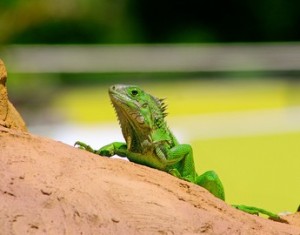

People come to Florida in the winter for many reasons. They love the sunny weather, mild winters and outdoor activities that we enjoy all year round. During the 2014/2015 winter, the Farmer’s Almanac predicts that most of Florida will have colder than normal temperatures. And when temperatures drop below 40, so do the iguanas and lizards.
Iguanas are not native to Florida. These lizards are cold-blooded and were thought to be introduced to Florida as released or escaped pets. However, they quickly bred and took over the many parts of Florida. Although their numbers are higher down in the southern part of the state, these lizards can be found living outside even up in the northern localities.
As the temperatures drop to the 40’s or below, the iguanas’ metabolism slows down as well. When the metabolism slows down, they become sluggish and lethargic. If they are hanging out in the trees, they will lose their grip and will simply fall out of the tree. Seeing several-feet long “frozen” iguanas lying around on the ground usually attracts quite a few onlookers.
Be careful, though! Most of these iguanas are not dead. They are, in fact, in a dormant state. Once the sun comes out and the weather heats up a little, so too do the lizards. They will start to become active again and will start to crawl around all over the place.
Special Note: Call Sunstate Pest right now and get 10% off first treatment. Just tell us promo code SUNSTATEWEB2014. Just call 1-800-781-PEST
Really not sure if this is true, but there is a story about a well-intentioned man who got more than he bargained for. After an unseasonably cold night, he looked at his window to see several “dead” lizards lying on the ground. In order to help keep his neighborhood clean, he started driving around in his truck throwing these lizards in the bed. Unfortunately, the weather heated up quite a bit during the day and within a few hours; he had about fifty lizards climbing all over his truck, in his garage and all around his house.
If it gets cold and stays cold for more than 24 hours, the chances of these iguanas waking up begin to reduce. The smaller ones usually die during a prolonged cold snap. However, because iguanas are considered invasive species and because their numbers have grown uncontrollably, having a few falling iguanas is not considered a bad thing. According to local herpetologists, this is because they have few native predators and their numbers could use a little thinning.
